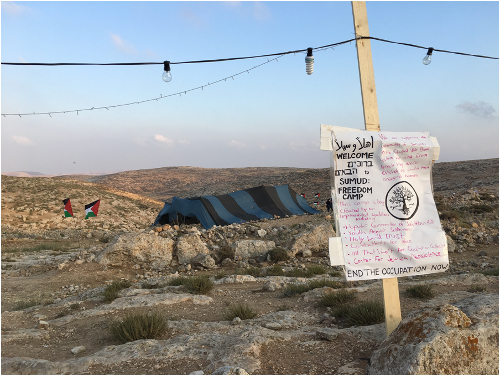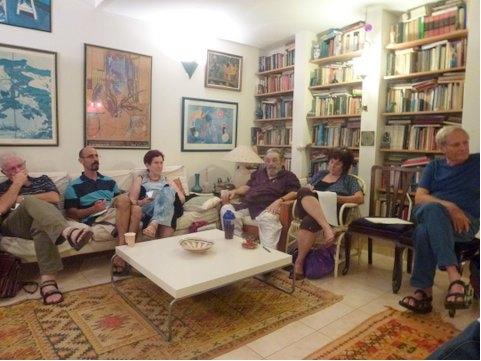Two weeks ago, I had the privilege of joining over 120 Diaspora Jews on a delegation to the West Bank with the Center for Jewish Nonviolence (CJNV). I knew very little about the trip before going, but I knew that marking fifty years of occupation was vitally important and my responsibility as an Israeli-American Jew.
Fifty years ago in 1967, my Israeli grandfather was drafted as a medic. His father had come to Palestine as a young Zionist, but always continued to work with Arab civil society. I have some of his notes that read “Jews should be living side-by-side with Arabs.” It’s clear to me that the current situation is not what he would have wanted. So, despite not knowing very much about what I’d be doing in the West Bank (CJNV did not want to send us much information online for the safety of our Palestinian partners), I finished my final exams and boarded a plane that same night. I anticipated some sort of transformation, or of being a part of something larger than myself. I was right.
Our first day in Bethlehem was orientation. Our main goal was to work as Diaspora Jews in solidarity with our Palestinian partners. This means that rather than setting the agenda ourselves, all the work we did was with the guidance and based on the needs of our Palestinian partners.
During the first few days of the trip I wrote notes feverishly: CJNV’s theory of change: “To lift up work happening on the ground and help shift the tide in the global Jewish community. CJNV exists at the intersection between Jewish transformation and Palestinian solidarity.” I wrote, “Nonviolence: existence is resistance, direct action,” understanding what those words meant intellectually, but not yet feeling them.
"Existence is Resistance"
Then, our work began. We started with “existence is resistance,” and our group was divided up among five different Palestinian cities and villages: Susya, Hebron, Issawiya, Silwan, and Umm al-Khair. I spent three days in Batan al-Hawa, a neighborhood in Silwan. B’tselem has described Batan al-Hawa as “the setting for the most extensive expulsion in recent years in East Jerusalem.” We could see the walls of the City of David clearly on the next hilltop. We picked up garbage from the streets. Despite being part of the Jerusalem municipality, the garbage rarely gets picked up there, often as an incentive for Palestinians to move out of their homes. We watched armored vans shuttle settler children to their homes, protected by private security guards paid for by the city of Jerusalem, including Palestinian taxpayers. We worked at a community center, painting murals, exchanging dances, eating copious amounts of rice, hummus, tomatoes and cucumbers.
Although I was glad to be a part of these actions, it was easy for me to forget where we were. I kept struggling to understand how picking up garbage constitutes standing against fifty years of occupation. After all, the garbage would be replaced on the streets within a week. I had to remind myself we were asked to do this work by our Palestinian partners.

A CJNV participant and community members work together to pick up garbage in Batan al-Hawa. (Photo: Ella Israeli)
I began to understand what our presence meant when I heard a teacher explain to some of the kids that although we are Jews, we were not like the settlers. I realized that for many members of the community in Batan al-Hawa, the only Jews they ever meet are either settlers or soldiers. One night after we left, Israeli police raided the center. No one was hurt or arrested and nothing was destroyed. This time. We asked if it was because of our presence there. Zuhair, the direct of the center responded no. He explained that this happens all the time. While I realized I could never fully feel it, I was beginning to more deeply understand what “existence is resistance” meant.
Direct Action: Building the Sumud Freedom Camp
For the remainder of our time in the West Bank, we worked on nonviolent direct action. We took part in an unprecedented coalition of Palestinian, Israeli, and Jewish Diaspora organizations including Youth Against Settlements شباب ضد الاستيطان, Combatants for Peace, Center for Jewish Nonviolence, Holy Land Trust, and All That's Left: Anti-Occupation Collective. This was the largest instance of Diaspora Jews taking direct action against the Occupation, led by our Palestinian partners.
We built the Sumud Freedom Camp in the Palestinian village of Sarura. Sumud means “steadfastness” in Arabic. Families were displaced from the village nearly 25 years ago because of intense settler violence. We hoped our presence would not only offer some protection to the residents of Sarura, but also bring international attention to the camp.

The Sumud Freedom Camp on the evening of Saturday, May 20th before the Israeli Defense Forces destroyed it. (Photo: Ella Israeli)
On the night of Thursday, May 18th, under the cover of darkness, half our group left Bethlehem to spend the night in At-Tuwani, another Palestinian village close to Sarura. This allowed us to walk to Sarura Friday morning, avoiding the possibility of getting stopped by the army or police. (Last year, a CJNV bus got stopped and detained on its way to their Cinema Hebron action.) Luckily, all of us, including those coming in on buses Friday morning, made it without incident. We worked to clear the caves, pitch a tent, rebuild walls, and bring families back to homes that had remained closed for years. Three settlers came on dirt bikes from the nearby settlement of Ma’on to see what was happening or to potentially cause trouble. They offered us a menacing “Shabbat Shalom,” but left when they realized they were severely outnumbered. As the sun set, Diaspora Jews, Israelis, and Palestinians joined in song for Kabbalat Shabbat. I said kaddish for my grandfather. Tears rolled down my cheeks as I thought about how proud he would be of me, for standing in solidarity with Palestinians, and for working towards the State of Israel both of us would want to see.
Our Judaism is solidarity and restoration, not destruction and demolition
After the service, we slept in our tent and continued work on Saturday. After 48 hours, after Shabbat ended, the IDF, the army of the Jewish State that I hold dear, came at night as nonviolent Palestinian, Jewish, and Israeli protesters shared dinner and danced. They tore down the tent we had used as shelter, stole our generator and punched nonviolent activists. No one was badly injured, largely because of our presence.
The next day, we rebuilt the camp because our Judaism does not include destruction or demolition. Rather, our Judaism includes solidarity and restoration and working to bring families home.
The camp remains standing two weeks later, even after two other raids by the army, which were longer and more violent. Again and again, Sumud Freedom Camp has been rebuilt. Palestinians, Israelis, and Jewish activists plan to remain there for as long as they can, even though the CJNV delegation has officially ended. The camp needs water, food, medical supplies, mattresses, etc. You can follow the progress of the camp on: #WeAreSumud #50yearstoomany #occupationisnotmyjudaism. Please donate here if you can:
https://www.generosity.com/community-fundraising/sumud-freedom-camp-a-right-to-stay.I am humbled and sad and motivated more than ever to continue this work, because occupation is not my Judaism, nor will it be my legacy.

CJNV participants gather with community members to watch a dabke dance performance at a community center in Batan al-Hawa in East Jerusalem. (Photo: Ella Israeli)
